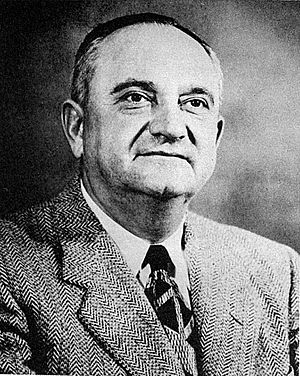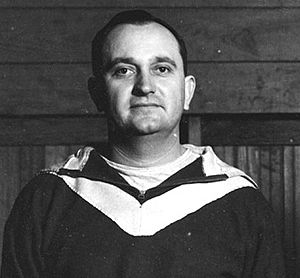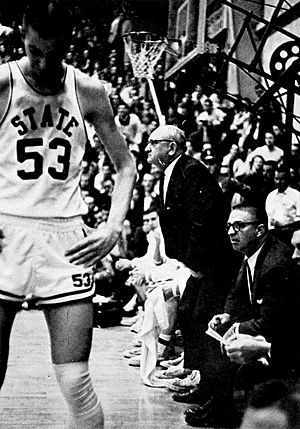Adolph Rupp facts for kids

Rupp in 1954
|
|
| Biographical details | |
|---|---|
| Born | September 2, 1901 Halstead, Kansas, U.S. |
| Died | December 10, 1977 (aged 76) Lexington, Kentucky, U.S. |
| Playing career | |
| 1920–1923 | Kansas |
| Coaching career (HC unless noted) | |
| 1926–1930 | Freeport HS |
| 1930–1972 | Kentucky |
| Head coaching record | |
| Overall | 876–190 (college) |
| Accomplishments and honors | |
| Championships | |
| As a coach 4× NCAA Division I tournament (1948, 1949, 1951, 1958) 6× NCAA Regional – Final Four (1942, 1948, 1949, 1951, 1958, 1966) 27× SEC regular season (1933, 1935, 1937, 1939, 1940, 1942, 1944–1952, 1954, 1955, 1957, 1958, 1962, 1964, 1966, 1968–1972) 13× SEC tournament (1933, 1937, 1939, 1940, 1942, 1944–1950, 1952) SoCon regular season (1932) As a player 2× Helms National (1922, 1923) |
|
| Awards | |
| 5× National Coach of the Year (1950, 1954, 1959, 1966, 1970) 7× SEC Coach of the Year (1964, 1966, 1968–1972) |
|
| Basketball Hall of Fame Inducted in 1969 |
|
| College Basketball Hall of Fame Inducted in 2006 |
|
Adolph Frederick Rupp (September 2, 1901 – December 10, 1977) was an American college basketball coach. He is ranked seventh in total victories by a men's NCAA Division I college coach, winning 876 games in 41 years of coaching at the University of Kentucky. Rupp is also second among all men's college coaches in all-time winning percentage (.822), trailing only Mark Few. Rupp was enshrined in the Naismith Memorial Basketball Hall of Fame on April 13, 1969.
Contents
Early life
Rupp was born September 2, 1901 in Halstead, Kansas to Heinrich Rupp, a German immigrant, and Anna Lichi, a Palatinate (Quirnheim, Germany) immigrant. The fourth of six children, Rupp grew up on a 163-acre farm that his parents had homesteaded. He began playing basketball as a young child, with the help of his mother, who made a ball for him by stuffing rags into a gunnysack. "Mother sewed it up and somehow made it round," he recalled in 1977. "You couldn't dribble it. You couldn't bounce it either."
Rupp was a star for the Halstead High School basketball team, one of the first in the area to play with a real basketball. He averaged 19 points a game. Former teammates described Rupp as the team's unofficial coach.
After high school, Rupp attended the University of Kansas from 1919 to 1923. He worked part-time at the student Jayhawk Cafe to help pay his college expenses. In 1922, Adolph pledged and was initiated into the Iota chapter of International Fraternity of Delta Sigma Pi. Later in 1966, he was named Deltasig of the Year by the fraternity. He was a reserve on the basketball team under Hall of Fame coach Phog Allen from 1919 to 1923. Assisting Allen during that time was his former coach and inventor of the game of basketball, James Naismith, whom Rupp also got to know well during his time in Lawrence.
In Rupp's junior and senior college seasons (1921–22 and 1922–23), Kansas (KU) had outstanding basketball squads. Later, both of these standout Kansas teams would be awarded the Helms National Championship, recognizing the Jayhawks as the top team in the nation during those seasons.
He received an MA from Teachers College, Columbia University.
High school coaching
Rupp began his career in coaching by accepting a teaching job at Burr Oak High School, Kansas. After a one-year stay, Rupp moved on to Marshalltown, Iowa, where he coached wrestling, a sport he knew nothing about at the time and learned from a book. He led the Marshalltown team to a state wrestling title in 1926.
In 1926–30, Rupp accepted the basketball head coaching position at Freeport High School, (Freeport, Illinois) where he also taught history and economics. During his four years at Freeport, Rupp compiled a record of 66–21 and guided his team to a third-place finish in the 1929 state tournament. While at Freeport High School Rupp started William "Mose" Mosely, the first African-American to play basketball at Freeport and the second to graduate from the school.
University of Illinois head basketball coach Craig Ruby was invited to speak at the team banquet following the 1929–30 season. Ruby informed Rupp of the Kentucky head coaching job and followed up by recommending him for the job.
During his time in Freeport, Rupp met his future wife, Esther Schmidt.
University of Kentucky
Rupp coached the University of Kentucky men's basketball team from 1930 to 1972. There, he gained the nicknames, "Baron of the Bluegrass", and "The Man in the Brown Suit". Rupp was inducted into Omicron Delta Kappa at Kentucky in 1937. Rupp's Wildcat teams won four NCAA championships (1948, 1949, 1951, 1958), one National Invitation Tournament title in 1946, appeared in 20 NCAA tournaments, had six NCAA Final Four appearances, captured 27 Southeastern Conference regular season titles, and won 13 Southeastern Conference tournaments. Rupp's Kentucky teams also finished ranked #1 on six occasions in the final Associated Press college basketball poll and four times in the United Press International (Coaches) poll. In addition, Rupp's 1966 Kentucky squad—nicknamed "Rupp's Runts"— finished runner-up in the NCAA tournament and Rupp's 1947 Wildcats finished runner-up in the National Invitation Tournament. Rupp's 1933 and 1954 Kentucky squads were also retroactively named national champions by the Helms Athletic Foundation; his 1934, 1947, and 1948 teams were retroactively named the national champion by the Premo-Porretta Power Poll.
In his 41 seasons as UK coach, Rupp coached 32 All-Americans, chosen 50 times, 52 All-SEC players, chosen 91 times, 44 NBA Draft Picks, 2 National Players-of-the-Year, 7 Olympic Gold Medalists, and 4 Naismith Memorial Basketball Hall of Fame members. He was a 5-time National Coach-of-the-Year award winner, and a 7-time Conference Coach-of-the-Year award winner. Rupp was inducted into the Naismith Memorial Basketball Hall of Fame, College Basketball Hall of Fame, Kentucky Athletic Hall of Fame, Kansas Athletic Hall of Fame, University of Kentucky Athletic Hall of Fame, and Helms Athletic Foundation Hall of Fame. Further, since 1972, the Adolph Rupp Trophy, considered one of the nation's premier basketball awards, has been given by the Commonwealth Athletic Club to the top men's college basketball player. In addition, the University of Kentucky retired a jersey in his honor in the rafters of Rupp Arena, a 23,500-seat arena named after him, dedicated in 1976.
Rupp was forced into retirement in March 1972, at the age of 70. At the time, this was the mandatory retirement age for all University of Kentucky employees.
1966 championship game against Texas Western
A pivotal game in Rupp's career and for college basketball in general was the 1966 NCAA championship game at Cole Field House against Texas Western, coached by Don Haskins. It featured Kentucky's all-white team against Texas Western's all-black starting five, and took place at the height of the Civil Rights Movement. The game, which Texas Western won 72–65, helped accelerate the ongoing integration movement in college basketball, as well as the overall recruiting approach of the SEC, ACC, and SWC conferences.
Coaching style and philosophy
Rupp was an early innovator of the fast break and set offense. His offense consisted of 10–15 set plays (with variations for each), complete with extensive offensive movement and screening. Early basketball innovations such as the "guard around" play and inside screen were first developed by Rupp in the 1930s. Likewise, he was an early proponent of the fast break, which his Kentucky teams used at every opportunity throughout his career. For most of his coaching career he preferred only a tight man-to-man defense, but during the 1963–64 season, he became one of the first coaches to begin experimenting with the trapping 1–3–1 zone defense, and his Kentucky teams used this defense at times for the remainder of his career. Throughout his time at Kentucky, Rupp's recruiting focused largely on local and regional talent; over 80% of Rupp's Kentucky players came from the state of Kentucky.
Rupp strongly emphasized the fundamentals of basketball, both on offense and defense, and overall discipline. He believed that excellence was achieved only through repetition, and his practices stressed individual instruction, precision, and continuity. Rupp was very demanding of his players, constantly putting extreme pressure on them in practice, and mercilessly berating them for any mistakes.
Superstitions
Rupp, a very superstitious man, was known to carry a "lucky" buckeye in his pocket. His favorite sign of good luck was finding a pin, especially a bobby pin, particularly on a game day. The depth of his superstitious nature was revealed while he was coaching at Freeport, when he had bought a new blue suit to replace his old brown one. He wore his new suit to a game, and his team got beaten badly. Rupp never again wore anything but a brown suit to games.
Civil rights
Rupp hired assistant coach Neil Reed in 1960 to help recruit African-American players and once asked the UK president to leave the SEC so he could recruit black players. Rupp tried his best to sign in-state black players Wes Unseld (the first black player Rupp made a formal scholarship offer in 1964) and Butch Beard before both picked Louisville. Rupp signed his first black player, troubled 7'2" center Tom Payne, who played in the 1971 season. After his lone varsity season, Payne, who was on the verge of flunking out of school, joined the NBA's first-ever supplemental draft.
Career after Kentucky
In April 1972, Rupp was named Team President of the Memphis Pros, soon to become the Memphis Tams, of the American Basketball Association.
In June 1973 Rupp quit as Tams president, calling the ABA "bush league" and saying it "would never survive". Three months later, Rupp was hired as Vice President of the Board of the Kentucky Colonels of the American Basketball Association.
Death
Rupp died of spinal cancer at age 76 in Lexington, Kentucky, on December 10, 1977, on a night when Kentucky defeated his alma mater, Kansas, at Allen Fieldhouse in Lawrence, Kansas. The game that night was promoted as "Adolph Rupp Night". He is buried in Lexington Cemetery. Rupp Arena, the current home of the Kentucky men's basketball team, is named in his honor.
Head coaching record
College
| Season | Team | Overall | Conference | Standing | Postseason | ||||
|---|---|---|---|---|---|---|---|---|---|
| Kentucky Wildcats (Southern Conference) (1930–1932) | |||||||||
| 1930–31 | Kentucky | 15–3 | 8–2 | 4th | |||||
| 1931–32 | Kentucky | 15–2 | 9–1 | T–1st | |||||
| Kentucky: | 30–5 | 17–3 | |||||||
| Kentucky Wildcats (Southeastern Conference) (1932–1972) | |||||||||
| 1932–33 | Kentucky | 21–3 | 8–0 | 1st | Helms National Champion | ||||
| 1933–34 | Kentucky | 16–1 | 11–0 | 1st | Premo-Porretta National Champion | ||||
| 1934–35 | Kentucky | 19–2 | 11–0 | T–1st | |||||
| 1935–36 | Kentucky | 15–6 | 6–2 | 1st | |||||
| 1936–37 | Kentucky | 17–5 | 5–3 | T–5th | |||||
| 1937–38 | Kentucky | 13–5 | 6–0 | 1st | |||||
| 1938–39 | Kentucky | 16–4 | 5–2 | 3rd | |||||
| 1939–40 | Kentucky | 15–6 | 4–4 | 6th | |||||
| 1940–41 | Kentucky | 17–8 | 8–1 | 1st | |||||
| 1941–42 | Kentucky | 19–6 | 6–2 | 3rd | NCAA final Four | ||||
| 1942–43 | Kentucky | 17–6 | 8–1 | 1st | |||||
| 1943–44 | Kentucky | 19–2 | NIT Third Place | ||||||
| 1944–45 | Kentucky | 22–4 | 4–1 | T-1st | NCAA Elite Eight | ||||
| 1945–46 | Kentucky | 28–2 | 6–0 | T-1st | NIT champion | ||||
| 1946–47 | Kentucky | 34–3 | 11–0 | 1st | NIT Runner-up, Premo-Porretta National Champion | ||||
| 1947–48 | Kentucky | 36–3 | 9–0 | 1st | NCAA champion, Premo-Porretta National Champion | ||||
| 1948–49 | Kentucky | 32–2 | 13–0 | 1st | NCAA champion, NIT Quarterfinal | ||||
| 1949–50 | Kentucky | 25–5 | 11–2 | 1st | NIT Quarterfinal | ||||
| 1950–51 | Kentucky | 32–2 | 14–0 | 1st | NCAA champion | ||||
| 1951–52 | Kentucky | 29–3 | 14–0 | 1st | NCAA Elite Eight | ||||
| 1952–53 | No team* | ||||||||
| 1953–54 | Kentucky | 25–0 | 15–0** | T–1st | Helms National Champion | ||||
| 1954–55 | Kentucky | 23–3 | 12–2 | 1st | NCAA Sweet 16 | ||||
| 1955–56 | Kentucky | 20–6 | 12–2 | 2nd | NCAA Elite Eight | ||||
| 1956–57 | Kentucky | 23–5 | 12–2 | 1st | NCAA University Division Elite Eight | ||||
| 1957–58 | Kentucky | 23–6 | 12–2 | 1st | NCAA University Division champion | ||||
| 1958–59 | Kentucky | 24–3 | 12–2 | T–2nd | NCAA University Division Sweet 16 | ||||
| 1959–60 | Kentucky | 18–7 | 10–4 | 3rd | |||||
| 1960–61 | Kentucky | 19–9 | 11–4** | T–2nd | NCAA University Division Elite Eight | ||||
| 1961–62 | Kentucky | 23–3 | 13–1 | T–1st | NCAA University Division Elite Eight | ||||
| 1962–63 | Kentucky | 16–9 | 8–6 | 5th | |||||
| 1963–64 | Kentucky | 21–6 | 11–3 | 1st | NCAA University Division Sweet 16 | ||||
| 1964–65 | Kentucky | 15–10 | 10–6 | 5th | |||||
| 1965–66 | Kentucky | 27–2 | 15–1 | 1st | NCAA University Division Runner-up | ||||
| 1966–67 | Kentucky | 13–13 | 8–10 | T–5th | |||||
| 1967–68 | Kentucky | 22–5 | 15–3 | 1st | NCAA University Division Elite Eight | ||||
| 1968–69 | Kentucky | 23–5 | 16–2 | 1st | NCAA University Division Sweet 16 | ||||
| 1969–70 | Kentucky | 26–2 | 17–1 | 1st | NCAA University Division Elite 8 | ||||
| 1970–71 | Kentucky | 22–6 | 16–2 | 1st | NCAA University Division Sweet 16 | ||||
| 1971–72 | Kentucky | 21–7 | 14–4 | T–1st | NCAA University Division Elite Eight | ||||
| Kentucky: | 876–190 | 399–75 | |||||||
| Total: | 876–190 | ||||||||
|
National champion Conference regular season champion Conference tournament champion |
|||||||||
- ** Record includes SEC playoff tiebreaker games
- The team did not play in the 1952–53 season because of involvement in a point shaving scandal.
See also
 In Spanish: Adolph Rupp para niños
In Spanish: Adolph Rupp para niños
- List of college men's basketball coaches with 600 wins
- List of NCAA Division I Men's Final Four appearances by coach



